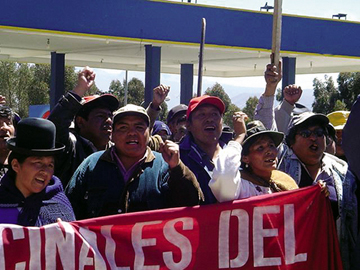Water
Life before profit
September 2005
Return to Table of Contents
Print Article
Bolivia
3 March 2005. The streets of El Alto, a city of 800,000 people, are brought to a standstill. A mass of people led by the Federation of Neighbourhood Committees, (FEJUVE), chants against the private company that controls their water services, “Aguas del Illimani has got to go!”
The people are demanding the company’s withdrawal and an end to the privatization of their water services. Some 200,000 of El Alto’s citizens are still without access to drinking water. “It’s a luxury to have access to water,” explains Miguel, a laid off worker now unable to pay his water bill. Julian Perez, a FEJUVE advisor, explains that by limiting access to water, “the company is depriving the people of El Alto of life itself.”
A CATCH-22 FOR COUNTRIES SEEKING DEBT RELIEF
In 1997, the International Monetary Fund (IMF) and the World Bank put pressure on Bolivia to privatize the water services in El Alto and La Paz by making privatization a condition for debt relief. Without consulting the people, the government signed a 30-year contract with Aguas del Illimani, a subsidiary of Suez, the French multinational. The deal was lucrative for the company, explains Abel Mamani, President of FEJUVE. “It was guaranteed a 13% rate of return!”
In return for an agreement to increase rates, the company promised to increase the number of households connected to the water system. However, the company’s interpretation of the ‘area to be served’ specified under the contract excluded several poor neighbourhoods that were home to thousands of people who migrated to the city from declining mining and rural regions.
This meant that 130,000 of the city’s poorest people could not receive water service without paying for the pipes and labour involved. Even in the areas recognized by the company, 70,000 people did not have the $544 required to hook up each house to the water and sewerage systems. This amount is equal to seven months’ minimum salary. These people were forced to draw water wherever they could.
WHO DECIDES?
The situation in El Alto is not unique. Governments have privatized their water services in Accra, Ghana; in Manila, the Philippines; and in Hamilton, Ontario. Everywhere, discontent rises as rates increase and the public is excluded from participating in the process.
“The people of Bolivia did not choose to privatize their water system,” explains Jim Shultz, Director of the Democracy Center. “Like many poor countries throughout the world, these choices were imposed on them when the World Bank decided to make privatization an explicit condition for obtaining assistance from the mid-1990s onward.”
FEJUVE and the people of El Alto were successful in getting the contract with Aguas del Illimani terminated. They demanded that the management of the community’s water resources be democratic and participatory. Yet, the World Bank and donor countries continue to press for a public-private partnership. For Ana Maria Vargas, a Development and Peace partner in El Alto, such outside pressure is undemocratic. “When it comes to managing a nation’s services,” she says, “people should develop a consensus and carry out public policy from the bottom up not the top down.”
WHO PROFITS?
The public management of water resources “is meant to develop a water system for the benefit of all, not to fatten the bank accounts of the few,” says Abel Mamani. With public management, the dividends are returned to the people, largely in the form of improved services.
However, the private sector does not see it this way. In 2001, the water resources sector of Suez alone generated more than $18 billion in revenues and returned $2.29 billion in dividends to stockholders. As a result, the bulk of the world’s efforts at privatizing water have failed to improve access to safe drinking water, a fundamental human right.
CANADIANS ARE INVOLVED!
How does this concern us? The privatization of public water services is not unique to poor countries. Water management for a number of Canadian municipalities like Hamilton, Moncton and Montreal, was or still is being targeted by private interests.
Public-private partnerships, or PPPs, have become more commonplace. Through PPPs, the government gives a private company a long-term contract to design, implement and operate a public service. The arrangement raises a number of issues. Among other things, the right to citizen access to information and to democratic control can be eroded.
TO FREELY CHOOSE ONE’S OWN FUTURE
...Canada is a member of the World Bank and the International Monetary Fund. These institutions strongly promote privatizing other countries’ water services, often regardless of what the public wants. It is ironic to recall that in Canada, our high standard of living is the result of communal choices and public ownership of services, such as water.
The Canadian government’s policies should continue to reflect this priority. Canada should defend the rights of people everywhere to participate democratically in decisions that impact their lives, and to pursue the common good.
The above was taken from the action sheet of the 2006 Development and Peace & KAIROS joint campaign.
Return to Table of Contents
Print Article
